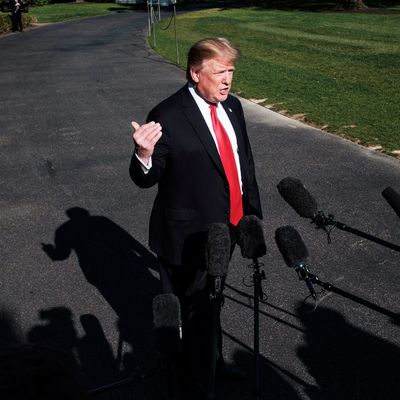
Last night Donald Trump and his family filed a lawsuit to prohibit Deutsche Bank and Capital One from turning over his financial information to congressional investigators. The legal basis for the lawsuit, in layman’s terms, is as follows: Congress is mean and only wants the information because it hates Trump. Or, to quote the only-slightly-more-sophisticated language of the lawsuit, “The subpoenas were issued to harass President Donald J. Trump, to rummage through every aspect of his personal finances, his businesses and the private information of the president and his family, and to ferret about for any material that might be used to cause him political damage. No grounds exist to establish any purpose other than a political one.”
This same argument runs nearly all of Trump’s refusals to abide congressional subpoenas. “These aren’t, like, impartial people,” the president declared of Congress. “The Democrats are trying to win 2020.”
The first thing to understand about this legal theory is that it is not a legal theory. Congress is a coequal branch of government which has a legal right to conduct investigations, including of the Executive branch and its officials. There is a legal gray zone around “executive privilege,” which describes the right of officials in the Executive branch to have some confidentiality around their internal discussions.
But Trump is not articulating a theory of executive privilege here. Nor would such a privilege cover a president’s right to maintain a business empire that accepts payments that may or may not be bribes disguised as legitimate reimbursements in complete secrecy from Congress and the public.
Essentially Trump’s argument is that congressional oversight is simply “politics” and, therefore, somehow null and void. Trump’s Deutsche Bank lawsuit has a passage that could have been lifted from an op-ed written by a sophomore member of the College Republicans. It quotes Nancy Pelosi promising “checks and balances to the Trump administration,” then asserts she was “not referring to legislation.” It proceeds to quote a series of journalists describing Congress’s investigations as being unpleasant for Trump:
The fact that journalists are describing congressional oversight as being difficult for Trump does not mean this was Congress’s sole intent. In any case, Congress’s dislike for Trump does not nullify its legal rights.
The American system of government of course is not predicated on different branches of government wanting to help each other out. Checks and balances assumes political competition. The system is designed to channel political rivalry into a productive synthesis. Of course Democrats are “trying to win.” So is Trump!
Trump’s notion that he can ignore legal obligations from anybody who isn’t “like, impartial” is especially comic. Trump has spent his presidency trampling on the the entire concept of neutral authority. His wild attacks on political norms have polarized every figure, requiring them either to submit to his demands or be identified as an enemy. Overtly fair-minded figures like Robert Mueller, or even friendly ones like Jeff Sessions, have been the target of Trump’s wrath simply for having the temerity to operate outside his personal control. The premise that he would accept “impartial” congressional oversight is a joke.
His refusal to abide oversight on the grounds that Congress is biased is so amateurish, legal experts are struggling to come up with ways to describe it. “This isn’t a close legal question,” Stanford law professor David Alan Sklansky tells the Washington Post, calling it “frivolous argument, even if it’s true.”
Trump’s opposition to congressional oversight appears to be an extension of his business strategy of threatening counterparties with expensive, time-consuming lawsuits in order to shirk his obligations. It worked in business, because he could bully smaller contractors who couldn’t afford the legal bills of a protracted fight to obtain their promised payments. Congress doesn’t have that problem, but the courts might take long enough processing the “arguments” that Trump can keep his scandals bottled up until after the election.
Trump’s extreme litigiousness is a natural extension of his general lack of shame. Once you have forfeited any claim to seriousness, there’s not much reputational cost in associating yourself with ridiculous legal assertions. What the courts need to decide is whether the president of the United States can treat Congress like some sucker carpenter that Trump decided not to pay.






























